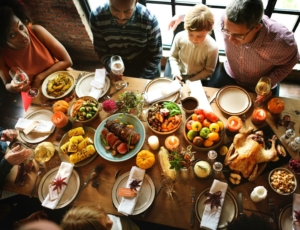Family gatherings mark special times when many come together for food and fun. We cook our favorite dishes, often ones that have been shared and remixed over the years. A pinch of this or a sprinkle of that characterizes signature meals, influenced by our own experiences and the generations who preceded us.
While recipes are as flavorful and diverse as a family itself, we may also share traits and experiences that complicate our gatherings. It does not have to be a holiday to know that our memories and expectations for present interactions can produce a recipe for disaster. San Diego Christian Counseling can offer valuable support in navigating family dynamics and fostering healthier relationships.
 Whether we are reuniting around festive or mournful times, the thought of being exposed to the people and places where we experienced trauma may cause us to avoid family events designed to bring us together. Unresolved pain from our past can activate undesirable responses. It details its own saga, much like family cookbooks and photo albums. The process, like our preferred family treats, may require spoonfuls of grace and dashes of time that only the Lord can work.
Whether we are reuniting around festive or mournful times, the thought of being exposed to the people and places where we experienced trauma may cause us to avoid family events designed to bring us together. Unresolved pain from our past can activate undesirable responses. It details its own saga, much like family cookbooks and photo albums. The process, like our preferred family treats, may require spoonfuls of grace and dashes of time that only the Lord can work.
Recipes for Reconciling
While it may not be clear initially, what we create, with God and one another, is a recipe for reconciliation.
Sweet or Sour?
Sometimes family histories are saturated with memories of trauma. When wounds from years past are left to ferment in the heart, we circulate toxicity through our thoughts, feelings, words, and actions. Until we acknowledge and address the pain and hurt, we will remain imprisoned by the past.
It seems daunting and impossible, but God is bigger than the mountains of unforgiveness, pride, and fear that sour peace and joy. As we heal from past ills, we need the peace that His Spirit brings.
Forgiveness vs. Reconciliation?
Forgiveness and reconciliation are not the same thing. We are commanded to forgive, though reconciliation is not always an extended part of that process. Forgiveness begins as the inside work that happens between us and God before funneling to anyone else. As God’s children, it expresses the heart of our Father’s nature.
That Forgiven Feeling
 Forgiveness is more than a feeling. Our emotions cannot dictate whether we should forgive or not. We cannot rely on feelings to indicate that we have forgiven our family or that others are nursing grudges. We resolve to endure emotional discomfort as we walk out the process, relying on the Holy Spirit to restore what we cannot see. With His supernatural assistance, we offer our part in repairing our breached connections.
Forgiveness is more than a feeling. Our emotions cannot dictate whether we should forgive or not. We cannot rely on feelings to indicate that we have forgiven our family or that others are nursing grudges. We resolve to endure emotional discomfort as we walk out the process, relying on the Holy Spirit to restore what we cannot see. With His supernatural assistance, we offer our part in repairing our breached connections.
And your ancient ruins shall be rebuilt; you shall raise up the foundations of many generations; you shall be called the repairer of the breach, the restorer of streets to dwell in. – Isaiah 58:12, ESV
Forgiveness entrusts the consequences of an offense to the Righteous Judge. Whether it is our own error or someone else’s, the truth remains that we have all offended God. Sin wound its way through humanity’s bloodline, passing through our first parents, Adam, and Eve. They, too, discovered human works could not approximate God’s righteousness. As a spotless sacrifice, Jesus remitted a sin debt that we could never pay. Only the grace of a loving God saves and reconciles us.
At the time we confess Christ as Savior, and as we yield our lives, the Holy Spirit continues His healing and deliverance work from the inside out. Our greater debt requires a better sacrifice that we could not manufacture on our own.
How can we hold someone else hostage, who is equally incapable of redeeming him or herself from the debilitating crush of sin’s weight? We all need a Redeemer, whose forgiveness enables us to release others, just as Jesus’ Blood has redeemed us.
Restored and Reconciled
The premise of our faith hinges on forgiveness and reconciliation, though we may not always reconcile even when we do forgive. As we repair family relationships, we have to walk through a healing process that involves humbling ourselves before we can reconnect with others.
The pain of family trauma can leave us fragmented and broken. Sharp, jagged pieces can damage those who try to handle another person’s brokenness. However, the Holy Spirit’s ministry of comfort and counsel can heal us directly and through mental health professionals.
In opening a door for reconciliation with a family member (or members), we need to set our hopes in the Lord. Years consumed by grief, anger, and bitterness may have soured us against our family. However, when we sense God calling us to live out forgiveness and healing, we must ask for His guidance and grace.
 The everlasting Father knows what the relationship will eventually look like, whether it will be restored or reconfigured with new boundaries and behaviors. Ultimately, we entrust our end to the One who authors and completes our faith, overseeing the metamorphosis of life and relationship.
The everlasting Father knows what the relationship will eventually look like, whether it will be restored or reconfigured with new boundaries and behaviors. Ultimately, we entrust our end to the One who authors and completes our faith, overseeing the metamorphosis of life and relationship.
Consider the following practical and spiritual encouragement that anchors hope, guards hearts, and causes us to remain open to when and how God orchestrates outcomes. As we grow through the Holy Spirit’s healing process, we must nurture our soul with healthy fellowship, while caring for our mental and emotional states.
Expecting an overnight transformation in ourselves or others is unrealistic, especially if we have generational patterns to disrupt and replace. However, it is possible as we reconfigure boundaries and rebuild the trust that’s part of soul care.
When seated at the Father’s table, we do not get to edit the guest list. We do not elect the family that births or adopts us. While it may seem random, God chose us for mutual benefit. Before the world came to be, He knew the masterpiece that He imagined (Ephesians 2:10). Only our unique set of characteristics and circumstances would generate the perfect blend for what He alone crafts for our lives.
Cannot Take the Heat
Initiate in Love
A popular phrase offers listeners an ultimatum. If you cannot take the heat, stay out of the kitchen. We often say it in jest, but the core message conveys that whatever we are managing will stir opposition. Instead of abandoning the “kitchen,” we need to be prepared for heat and discomfort as we commit to relationship recovery.
There may be difficult questions and conversations, whose answers only come when engaging with one another. God, who has already begun working in us, will continue to form and fashion what He wants to see through these challenges until we are presented faultless and face-to-face with Christ (Philippians 1:6).
To him who is able to keep you from stumbling and to present you before his glorious presence without fault and with great joy. – Jude 1:24, NIV
Furthermore, we must prepare our hearts to properly respond to our loved ones. As believers, all we do needs to be steeped in truth and love, ready to release the same grace and mercy that Jesus has lavished on us.
We must filter what and how we hear, by the Spirit. Our nonverbal communication and the words we speak must emerge from a heart transformed by the Word. Our actions and outcomes will, in God’s creative manner, reflect the fruit that the Lord has been maturing through the reconciliation process.
Next Steps
 No person or family is perfect. There will be countless opportunities to engage in the practice and process of reconciliation. You should pray, pause, and resume when appropriate. You will be endowed with fresh resolve, perspective, and Holy Spirit wisdom. No one is beyond redemption when God is the One mixing unlikely people and circumstances.
No person or family is perfect. There will be countless opportunities to engage in the practice and process of reconciliation. You should pray, pause, and resume when appropriate. You will be endowed with fresh resolve, perspective, and Holy Spirit wisdom. No one is beyond redemption when God is the One mixing unlikely people and circumstances.
Give grace as you and your family grow together in the reconciliation process. Savor the work of the Holy Spirit, learning to serve the love and patience He freely gives. Receive the Father’s compassion as you grow into the version of you that God had planned.
If you feel you need help on this journey toward forgiveness and reconciliation, reach out to us today at San Diego Christian Counseling. We will locate an empathetic counselor from our directory who will talk you through the process of healing.
“Thanksgiving Dinner”, Courtesy of Curated Lifestyle, Unsplash.com, Unsplash+ License; “Stressed”, Courtesy of Daniel Reche, Pexels.com, CC0 License; “Forgiveness”, Courtesy of Alex Shute, Unsplash.com, CC0 License; “Reaching Out”, Courtesy of Community Image, Pixabay.com, CC0 License


